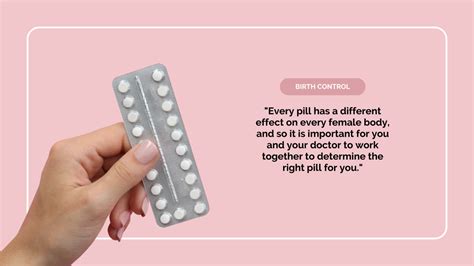Intro
Discover various pill contraceptive types, including combination, progestin-only, and extended-cycle options, to understand their differences, benefits, and side effects, and make informed choices about hormonal birth control methods.
The pill, a form of hormonal contraception, has revolutionized the way people approach family planning and reproductive health. With numerous types of pill contraceptives available, individuals can choose the one that best suits their needs, lifestyle, and health status. The importance of understanding the different types of pill contraceptives cannot be overstated, as it enables individuals to make informed decisions about their reproductive health and well-being. In this article, we will delve into the various types of pill contraceptives, their benefits, and their potential side effects.
The development of pill contraceptives has been a significant milestone in the history of reproductive health. The first birth control pill, approved in the 1960s, marked the beginning of a new era in family planning. Since then, numerous types of pill contraceptives have been developed, each with its unique characteristics, benefits, and potential drawbacks. Understanding the different types of pill contraceptives is crucial for individuals who want to take control of their reproductive health and make informed decisions about their bodies.
The pill contraceptive market has experienced significant growth over the years, with new products being introduced regularly. This growth has been driven by advances in medical technology, changes in consumer preferences, and the increasing demand for effective and convenient forms of contraception. As the market continues to evolve, it is essential for individuals to stay informed about the different types of pill contraceptives available, their benefits, and their potential side effects. By doing so, individuals can make informed decisions about their reproductive health and choose the pill contraceptive that best suits their needs.
Types of Pill Contraceptives

There are several types of pill contraceptives available, each with its unique characteristics and benefits. The most common types of pill contraceptives include:
- Combined oral contraceptives (COCs): These pills contain both estrogen and progestin, which work together to prevent ovulation and thicken the cervical mucus, making it difficult for sperm to reach the egg.
- Progestin-only pills (POPs): These pills contain only progestin, which thickens the cervical mucus and prevents ovulation.
- Extended-cycle pills: These pills allow individuals to have fewer periods per year, with some pills designed to be taken for 84 days followed by a 7-day break.
- Continuous-cycle pills: These pills are taken every day, with no break in between, to prevent menstruation altogether.
Benefits of Pill Contraceptives
The benefits of pill contraceptives are numerous and well-documented. Some of the most significant advantages of using pill contraceptives include:- Effective contraception: Pill contraceptives are highly effective in preventing pregnancy, with a failure rate of less than 1% when taken correctly.
- Regulation of menstrual cycles: Pill contraceptives can help regulate menstrual cycles, reducing the risk of irregular periods and menstrual cramps.
- Reduction of menstrual symptoms: Pill contraceptives can help alleviate symptoms such as bloating, breast tenderness, and mood swings associated with menstruation.
- Protection against certain health conditions: Some pill contraceptives have been shown to protect against certain health conditions, such as ovarian cysts, endometriosis, and iron deficiency anemia.
How Pill Contraceptives Work

Pill contraceptives work by preventing ovulation, thickening the cervical mucus, and altering the lining of the uterus. The exact mechanism of action depends on the type of pill contraceptive being used. Combined oral contraceptives, for example, contain both estrogen and progestin, which work together to prevent ovulation and thicken the cervical mucus. Progestin-only pills, on the other hand, contain only progestin, which thickens the cervical mucus and prevents ovulation.
Potential Side Effects of Pill Contraceptives
While pill contraceptives are generally safe and effective, they can cause potential side effects in some individuals. Some of the most common side effects of pill contraceptives include:- Nausea and vomiting
- Breast tenderness
- Headaches
- Mood swings
- Weight gain or loss
- Changes in libido
It is essential to note that not all individuals will experience side effects, and the severity of side effects can vary from person to person. If side effects persist or become severe, it is crucial to consult a healthcare provider for guidance and support.
Choosing the Right Pill Contraceptive

Choosing the right pill contraceptive can be a daunting task, especially with the numerous options available. When selecting a pill contraceptive, it is essential to consider factors such as:
- Medical history: Certain medical conditions, such as high blood pressure, diabetes, or a history of blood clots, may affect the choice of pill contraceptive.
- Lifestyle: Individuals with busy lifestyles may prefer a pill contraceptive with a simple regimen, such as a once-daily pill.
- Personal preferences: Some individuals may prefer a pill contraceptive that allows for more control over their menstrual cycles, while others may prefer a pill that reduces the frequency of periods.
Consulting a Healthcare Provider
Consulting a healthcare provider is crucial when choosing a pill contraceptive. A healthcare provider can help individuals:- Determine the best pill contraceptive for their needs and health status
- Discuss potential side effects and risks associated with pill contraceptives
- Monitor their health and adjust the pill contraceptive regimen as needed
Pill Contraceptive Myths and Misconceptions

There are several myths and misconceptions surrounding pill contraceptives. Some of the most common myths include:
- Pill contraceptives cause weight gain: While some individuals may experience weight gain when taking pill contraceptives, this is not a universal side effect.
- Pill contraceptives are only for young people: Pill contraceptives can be used by individuals of all ages, provided they are in good health and do not have any underlying medical conditions that may interact with the pill.
- Pill contraceptives are 100% effective: While pill contraceptives are highly effective, they are not 100% effective. It is essential to take the pill correctly and consistently to minimize the risk of pregnancy.
Debunking Pill Contraceptive Myths
It is essential to debunk pill contraceptive myths and misconceptions to ensure that individuals have accurate information when making decisions about their reproductive health. By consulting reputable sources and healthcare providers, individuals can separate fact from fiction and make informed decisions about their reproductive health.Pill Contraceptives and Mental Health

There is a complex relationship between pill contraceptives and mental health. Some individuals may experience changes in mood, anxiety, or depression when taking pill contraceptives. However, it is essential to note that the relationship between pill contraceptives and mental health is not fully understood and may vary from person to person.
Monitoring Mental Health
It is crucial to monitor mental health when taking pill contraceptives. Individuals should be aware of any changes in their mood, anxiety levels, or overall mental well-being. If concerns arise, it is essential to consult a healthcare provider for guidance and support.Pill Contraceptives and Fertility

There is a common misconception that pill contraceptives can affect fertility. However, most pill contraceptives do not have a long-term impact on fertility. In fact, fertility typically returns to normal within a few months of stopping the pill.
Planning for Pregnancy
Individuals who plan to become pregnant in the future should consult a healthcare provider for guidance on the best pill contraceptive for their needs. A healthcare provider can help individuals:- Choose a pill contraceptive that is safe and effective
- Discuss the potential impact of pill contraceptives on fertility
- Develop a plan for transitioning off the pill when trying to conceive
What are the most common types of pill contraceptives?
+The most common types of pill contraceptives include combined oral contraceptives (COCs), progestin-only pills (POPs), extended-cycle pills, and continuous-cycle pills.
How do pill contraceptives work?
+Pill contraceptives work by preventing ovulation, thickening the cervical mucus, and altering the lining of the uterus. The exact mechanism of action depends on the type of pill contraceptive being used.
What are the potential side effects of pill contraceptives?
+Potential side effects of pill contraceptives include nausea and vomiting, breast tenderness, headaches, mood swings, weight gain or loss, and changes in libido.
Can pill contraceptives affect fertility?
+Most pill contraceptives do not have a long-term impact on fertility. In fact, fertility typically returns to normal within a few months of stopping the pill.
How do I choose the right pill contraceptive for my needs?
+When choosing a pill contraceptive, it is essential to consider factors such as medical history, lifestyle, and personal preferences. Consulting a healthcare provider can help individuals determine the best pill contraceptive for their needs and health status.
In summary, pill contraceptives are a highly effective and convenient form of contraception. With numerous types of pill contraceptives available, individuals can choose the one that best suits their needs, lifestyle, and health status. By understanding the different types of pill contraceptives, their benefits, and potential side effects, individuals can make informed decisions about their reproductive health and well-being. We invite you to share your thoughts, experiences, and questions about pill contraceptives in the comments section below. Additionally, if you found this article informative and helpful, please share it with your friends and family to help spread awareness about the importance of reproductive health and the benefits of pill contraceptives.
